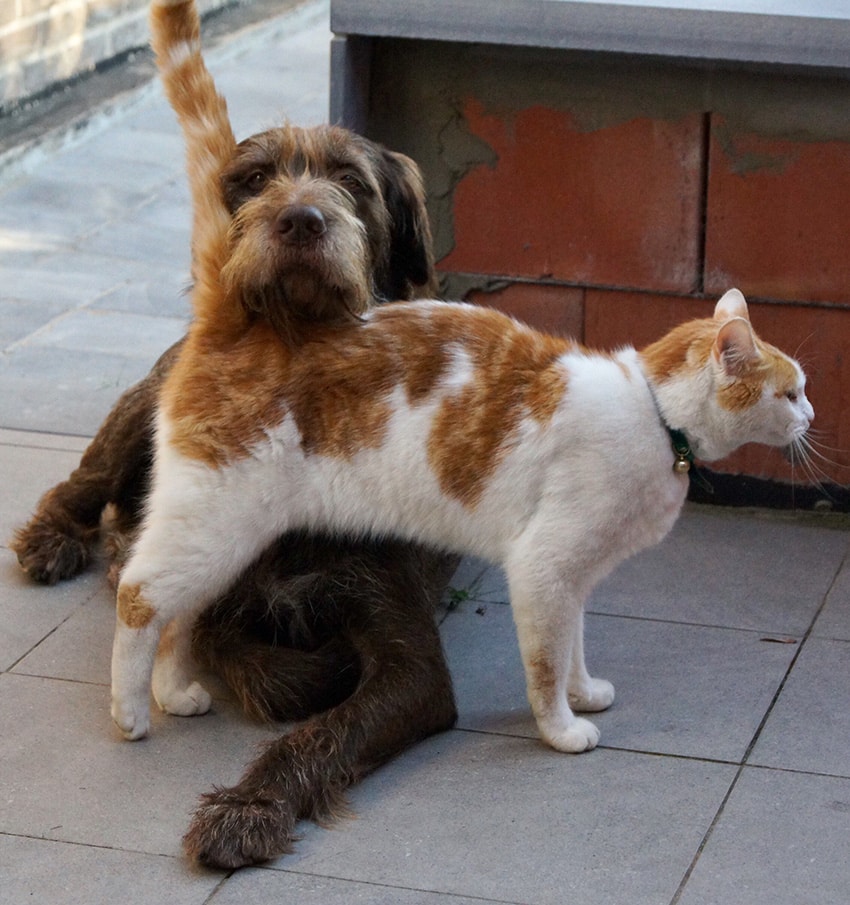Did you know that your pooch could be allergic to dog shampoo? Well, more specifically, they can be allergic to certain ingredients in some shampoos.
Luckily, I don’t see this very often in my patients. It’s possibly more common for a dog to have an adverse reaction to a product if they’re already suffering with allergies or inflamed skin.
If your pooch has known allergies, not just to shampoo ingredients, then you should always test a new product on a small area of your dog’s skin before giving them a full bath to prevent a severe reaction.
Allergies or adverse reactions to shampoos tend to be isolated to a dog’s skin or mouth if they’ve licked some from their fur. Sometimes, a pooch won’t have a severe reaction when they’re first bathed with a shampoo, but these reactions can become much worse with repeated exposure.
This article will help you to recognize if your fur baby has an allergy to their shampoo and how to treat adverse reactions. We’ll explain when you should seek veterinary advice and some tips on preventing reactions in sensitive pooches.
Let’s get started
How do you know if your dog is allergic to shampoo?

In the same way as humans, an allergic reaction is when a dog’s immune system considers a certain chemical or protein as foreign and mounts a response to “fight” off the intruder. Reactions can range from very mild redness all the way to an anaphylactic shock response, though the latter is very rare in dogs.
The typical adverse reaction to shampoo is contact dermatitis and is limited to your fur-baby’s skin. Acute reactions will have your dog develop hives while being bathed or developing blisters and rashes rapidly after using the offending shampoo. A more severe reaction would include swelling of your dog’s face or extremities that requires a trip to your emergency vet clinic.
Delayed reactions to shampoo tend to present as face rubbing, head shaking, obsessive scratching, or licking, particularly on the paws, neck, and ears. These inflamed areas tend to be intensely itchy, and scratching can lead to skin infections and bald patches.
The only way to truly diagnose an allergic reaction is to have an intradermal skin test performed by your veterinarian.
Signs that your pooch may be having an allergic reaction include:
- Hives/Blisters/Reddened skin
- Swelling (especially face and neck)
- Pruritis (itchiness)
- Paw chewing and licking
What ingredients cause shampoo allergies?
There are so many shampoos available on the market, all with a vast array of ingredients that could cause an adverse reaction in your fur-baby. It’s not the ingredients that cause allergic reactions, but actually your dog’s immune system over-reacting to a certain chemical or protein.
Preservatives are a necessary addition to many shampoos in order to prevent bacterial growth and spoiling of the shampoo. These products also help to maintain the appropriate pH balance and desired action of the shampoo. Not all preservatives are bad.
There aren’t ingredients that actually cause allergic reactions but the biggest possibilities are probably some essential oils or artificial perfumes which can cause reactions in pooches.
Ingredients such as Sodium Laureth sulfate don’t cause true allergic reactions. They can be drying on the skin of sensitive pooches and lead to itching and flaky skin but these aren’t allergies per se.
You may see articles listing many preservatives and other ingredients in dog shampoos that are “common causes of allergies”.
These aren’t strictly true as for the vast majority of dogs these products are completely safe; otherwise, they wouldn’t be on the market for long. In fact any ingredient can cause an allergic reaction in a sensitive pooch, while some are known to more commonly lead to skin irritation that may or may not be allergic in nature.
Any ingredient can be an allergen. The cause of these reactions is a pooch’s immune system over-reacting to a protein that’s present in the shampoo.
What does a Shampoo allergy look like?

Shampoo allergies are thankfully rare in our pooches and most often the skin reactions seen are due to already inflamed skin becoming further irritated with some of the ingredients.
Anaphylactic (life-threatening) reactions are exceptionally rare but would be indicated if your dog becomes dull or very lethargic with difficulty breathing or swelling of their face or muzzle during or after a bath. If this happens, rinse your dog rapidly and get them to your veterinarian as soon as possible.
The more likely indicators that your dog has an allergy to one of the ingredients in their shampoo are intense pruritis or itchiness of their skin with aggressive licking and chewing at their paws. Some pooches even break out in rashes or hives.
What are the symptoms of an allergic reaction to shampoo?
Signs that your dog may be allergic to their shampoo are similar to those of other allergic reactions and irritations.
The most common of these are redness of the skin and intense itchiness that causes your dog to chew and lick their paws, persistently scratch their neck with their hind foot and some dogs even develop hives. Some of the less common but potentially more serious signs are swelling of the face and muzzle, lethargy, and breathing difficulties that may indicate an anaphylactic reaction.
If your dog shows any of these signs you should contact your veterinarian immediately.
Can dog shampoo cause rashes?
In short, yes. dog shampoos can cause inflammation in some dogs, and since they are a topical product, rashes, redness, hives, and blistering are common symptoms. These reactions are often exacerbated by self-trauma inflicted by your pooch trying to relieve the intense pruritic reaction associated with an allergy.
If your dog has a reaction then the best thing to do is to contact your pooch’s veterinarian in the first instance for advice.
Skin rashes are one of the most commonly seen allergic reactions to shampoos in our canine companions.
How to treat an allergic reaction to shampoo?

Treatment for an allergic reaction will depend on the severity. As soon as you notice a reaction in your fur-baby you should completely and thoroughly rinse the shampoo from their fur and coat. Use cool water to reduce causing further damage to your dog’s skin.
Your veterinarian may prescribe Antihistamine or Corticosteroid either topically or orally. FluentWoof doesn’t advise specific doses for dogs of any of these products as your own DVM will know your dog’s requirements best, and this is especially important if your pooch is taking other medications.
If your dog is having a severe reaction or possible Anaphylaxis, then emergency treatment by your veterinarian is essential. Your veterinarian will administer supportive therapy, including fluids, oxygen, and epinephrine, to treat your dog.
There are a variety of topical and oral treatments available to help dogs with allergies. Your veterinarian will be able to advise you of the most appropriate medication for your dog’s allergy – corticosteroids, antihistamines etc.
How long does shampoo allergy last?
There’s no straight answer to this question as your dog may have residual skin irritation for up to a few weeks following a severe skin allergy to shampoo, or some dog’s may be free of any signs within a couple of days.
If your dog has severely traumatized their already inflamed skin to the point of an infection developing, then this will certainly prolong their healing time.
Shampoo allergies can last as short as a day or two, or severe skin reactions could linger for weeks. Your DVM will provide you with the best treatment to help soothe your dog’s condition.
What can I use on my allergic dog instead of shampoo?
Once your dog has been diagnosed with an allergy to a particular ingredient, the simplest option is to switch to a shampoo that doesn’t contain the offending ingredient. If your pooch is allergic to more than one ingredient, then selecting a shampoo can be a little more challenging.
The best way to determine exactly what your dog is allergic to is to have your veterinarian perform an intradermal skin test. This can help you to more definitively determine the cause of your dog’s allergy and enable you to avoid it in the future.
Hypoallergenic shampoos are also available for dogs, and these tend to contain mild ingredients that are unlikely to cause an allergic reaction. Many of these contain oatmeal and coconut oil so you still need to check the ingredients carefully if your fur-baby has allergies to any so-called “natural” ingredients.
You can still use shampoo on your pooch, after all they still need to be bathed; you just need to be more cautious when selecting a product to ensure it doesn’t contain the offending allergen for your pooch.
The Final Woof

Just like any other product, it’s possible for our canine sidekicks to be allergic to shampoos. If you’re concerned that your fur-baby has a shampoo allergy, then you should consult your DVM in the first instance.
Your veterinarian will be able to help you treat any irritation or skin infection that may have occurred due to an allergy. Once your dog is back to its normal self then allergy tests can be performed to help diagnose exactly what the allergen is that’s affecting your fur-baby.
Your veterinarian will also be able to recommend specific brands that may be less likely to cause a reaction in your dog. Luckily, it’s relatively easy to manage a shampoo allergy once you take the time to check ingredients thoroughly to ensure what your pooch is allergic to isn’t within the often long list of shampoo contents.


